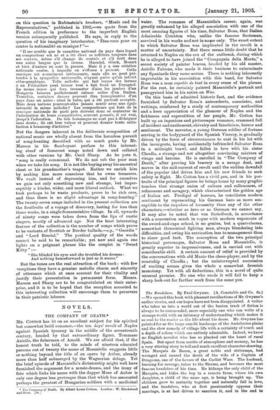Ma. COTTON has lit on an excellent subject for his
spirited but somewhat lurid romance,—the ten days' revolt of Naples against Spanish tyranny in the middle of the seventeenth century, headed by that extraordinary figure, Tommaso Aniello, the fisherman of Amalfi. We are afraid that, if the honest truth be told, to the minds of nineteen educated persons out of twenty the name of Masaniello suggests little or nothing beyond the title of an opera by Anber, already more than half submerged by the Wagnerian deluge. Yet the brief episode of Masaniello's dictatorship might well have furnished the argument for a music-drama, and the irony of fate which links his name with the dapper Muse of Anber is only one degree less grotesque than that which has associated perhaps the greatest of Hungarian soldiers with a medicinal • Tho Company of Death. By Albert Louis Cotton. London : W. Blackwood and Sons. [6s.j water. The romance of Masaniello's career, again, was greatly enhanced by his alleged association with one of the most amazing figures of his time, Salvator Rosa, that Italian Admirable Crichton who, unlike the famous Scotsman, survived in his works and not in name only. The exact extent to which Salvator Rosa was implicated in the revolt is a matter of uncertainty. But there seems little doubt that he returned to Naples on the eve of the outbreak, during which he is alleged to have joined the " Compagnia della Morte," a secret society of painter bravos, headed by his old master, Aniello Falcone, who made it their business to exterminate any Spaniards they came across. There is nothing inherently improbable in his association with this band, for Salvator Rosa was a man capable de tout in every sense of the phrase. For the rest, he certainly painted Masaniello's portrait and panegyrised him in his satire on War.
On this basis of admitted historic fact, and the evidence furnished by Salvator Rosa's antecedents, associates, and writings, reinforced by a study of contemporary authorities and a keen appreciation of the glamour of Naples and the fickleness and superstition of her people, Mr. Cotton has built up an ingenious and picturesque romance, crammed full of incident and excitement, chivalry and fanaticism, horror and sentiment. The narrator, a young German soldier of fortune serving in the bodyguard of the Spanish Viceroy, is gradually driven by the force of circumstances to cast in his lot with the insurgents, having accidentally befriended Salvator Rosa in a midnight brawl, and fallen in love with his sister Claudia, a strange and not altogether convincing mixture of virago and heroine. He is enrolled in " The Company of Death," after proving his bravery in a savage duel, and moves in the mid-current of revolt until the sudden downfall of the popular idol drives him and his new friends to seek safety in flight. Mr. Cotton has a vivid pen, and in his por- traits of the principal figures he brings home by many graphic touches that strange union of culture and callousness, of refinement and savagery, which characterised the golden age of Italian art. Prodigal of horrors, he conciliates modern sentiment by representing his German hero as more sus- ceptible to the impulses of humanity than any of the other characters,—whether as hero or as German we cannot say. It may also be noted that von Striedbeck, in accordance with a convention much in vogue with modern exponents of the sword-and-cape school, is no genius, but a quarrelsome, somewhat thrasonical fighting man, always blundering into difficulties, and owing his extrication less to management than to sheer good luck. The conception of the two principal historical personages, Salvator Rosa and Masaniello, is greatly superior in impressiveness, and is carried out with considerable skill. A certain amount of relief is provided by the conversations with old Muzio the chess-player, and by the courtship of Claudia ; but the uninterrupted succession of exciting scenes gives the whole a somewhat feverish monotony. Yet with all deductions, this is a novel of quite unusual promise. No one who reads it will fail to keep a sharp look-out for further work from the same pen.






































 Previous page
Previous page